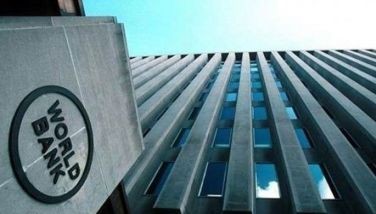Government vows to contain budget deficit this year
November 18, 2001 | 12:00am
The government is assuring its multilateral creditor the International Monetary Fund (IMF) that it will contain its widening budget deficit and keep it within target through cost-cutting measures.
Department of Finance (DOF) sources said the department is currently in the process of determining which expenditures to cut to make up for the shortfall in revenue collection in the remaining months.
Documents show the government has forecast a "worst but improbable" scenario of a P16-billion revenue shortfall this year which could result in a deficit of P161 billion from the original target of P145 billion.
An IMF team is scheduled to conduct a two-week review of the country’s fiscal position as well as its monetary and macroeconomic targets under a post-program monitoring scheme.
Under the post-program monitoring, the IMF periodically conducts a review of the country’s economic targets, a requirement for it to acquire a seal of good housekeeping.
Finance Secretary Jose Isidro Camacho had said the only way for government to meet its deficit target is to control its spending since the government’s tax collection agencies — the Bureau of Internal Revenue and the Bureau of Customs — have already admitted they are not likely to meet their targets.
On the other hand, privatization efforts are also likely to falter despite government’s bullishness that it can generate P12 to P13 billion in net proceeds from the issuance of Philippine Amusement and Gaming Corp. bonds and the sale of a piece of property managed by the Philippine Estates Authority.
Camacho said along with proceeds from Treasury bills and locally-issued bonds, the government expects to finish the year with a P28.8 billion cash balance.
Analysts have said the government will have difficulty sticking to its budget deficit target, especially since it downscaled its macroeconomic targets.
Because of the slowdown in the economy, government has lowered its GDP target to 3.3 percent to 3.8 percent from 3.8 percent to 4.2 percent while its GNP target was reduced to 3.5 percent to 3.9 percent from four percent to 4.5 percent.
Resolving the fiscal imbalance is the key for the Philippines to get a better credit rating from international credit rating agencies, notably Standard & Poor’s and Moody’s Investor Services. These agencies downgraded last year the country’s credit outlook to "negative" from "stable".
An improvement in the credit rating would help the Philippines raise cheaper funds abroad since investors would not demand higher returns on their funds.
The government’s failure to meet the fiscal target has been the sorest spot in the previous administration, turning off potential investors. The Estrada administration failed to complete its program with the IMF as a result of this. Accordingly, foreign creditors have demanded higher interest rates on borrowings of the government and the private sector.
At the same time, the IMF generally frowns on government’s move of cutting expenditures to contain the deficit since pump-priming measures are being sacrificed, with this option.
Department of Finance (DOF) sources said the department is currently in the process of determining which expenditures to cut to make up for the shortfall in revenue collection in the remaining months.
Documents show the government has forecast a "worst but improbable" scenario of a P16-billion revenue shortfall this year which could result in a deficit of P161 billion from the original target of P145 billion.
An IMF team is scheduled to conduct a two-week review of the country’s fiscal position as well as its monetary and macroeconomic targets under a post-program monitoring scheme.
Under the post-program monitoring, the IMF periodically conducts a review of the country’s economic targets, a requirement for it to acquire a seal of good housekeeping.
Finance Secretary Jose Isidro Camacho had said the only way for government to meet its deficit target is to control its spending since the government’s tax collection agencies — the Bureau of Internal Revenue and the Bureau of Customs — have already admitted they are not likely to meet their targets.
On the other hand, privatization efforts are also likely to falter despite government’s bullishness that it can generate P12 to P13 billion in net proceeds from the issuance of Philippine Amusement and Gaming Corp. bonds and the sale of a piece of property managed by the Philippine Estates Authority.
Camacho said along with proceeds from Treasury bills and locally-issued bonds, the government expects to finish the year with a P28.8 billion cash balance.
Analysts have said the government will have difficulty sticking to its budget deficit target, especially since it downscaled its macroeconomic targets.
Because of the slowdown in the economy, government has lowered its GDP target to 3.3 percent to 3.8 percent from 3.8 percent to 4.2 percent while its GNP target was reduced to 3.5 percent to 3.9 percent from four percent to 4.5 percent.
Resolving the fiscal imbalance is the key for the Philippines to get a better credit rating from international credit rating agencies, notably Standard & Poor’s and Moody’s Investor Services. These agencies downgraded last year the country’s credit outlook to "negative" from "stable".
An improvement in the credit rating would help the Philippines raise cheaper funds abroad since investors would not demand higher returns on their funds.
The government’s failure to meet the fiscal target has been the sorest spot in the previous administration, turning off potential investors. The Estrada administration failed to complete its program with the IMF as a result of this. Accordingly, foreign creditors have demanded higher interest rates on borrowings of the government and the private sector.
At the same time, the IMF generally frowns on government’s move of cutting expenditures to contain the deficit since pump-priming measures are being sacrificed, with this option.
BrandSpace Articles
<
>
- Latest
- Trending
Trending
Latest























